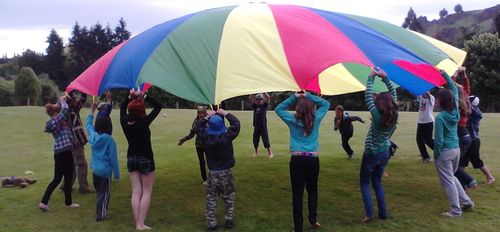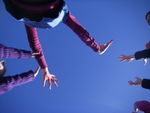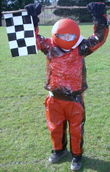ERO - Education Revolution Open
From WikiEducator
| “ | Let's not reform education.
Let's revolutionise education. Let's set aside the decaying and decrepit schools, and education paradigms of past eras and commit ourselves to a new understanding of education that recognizes humans as natural learners and extends basic human rights to children in their learning endeavors. |
” |
| —AERO | ||
Contents
- 1 Goals:
- 2 Rationale:
- 3 Strands
- 4 Open Education
- 5 Democratic Schools
- 6 Social literacy
- 7 Envirethical Education
- 8 Education for a green society
- 9 Progressive Education
- 10 Tuakana–teina
- 11 Reggio Emilia Movement
- 12 Natural Learning
- 13 Transition
- 14 Sharing with students
- 15 Teacher musings
- 16 Video links
- 17 Audio Links
- 18 Parent Information Sessions
- 19 Links
Goals:
- To remix the revolutionary strands that will shape;
- the schooling that educationalists are calling for
- what our children deserve,
- and our planet needs
- To create a hub for revolutionary educational ideas using OPEN - Creative Commons licensing
- To make connections, share links and show examples
Rationale:
- An over standardisation has lead to a narrowing of curriculum,
- failing and labelling students who don't fit the predetermined learning bands
- Regulations abound, stifling creativity,
- sabotaging spontaneity and natural learning
- Revolutionary educational ideas sit beyond the realm of:
- governments, corporates, schools or idealists,
- using Creative Commons licensing to share these ideas
- Sir Ken Robinson - the current education system squanders creativity
- governments, corporates, schools or idealists,
Strands
Open Education
- Open for scrutiny from every possible angle - child, parent, staff, community
- Accessible to all
- The umbrella that all other ideas sit beneath - freedom
Democratic Schools
- “Education in which young people have the freedom to organise their daily activities, and in which there is equality and democratic decision-making among young people and adults”.
- as quoted from AERO’s Directory of Democratic Education.
Social literacy
- An active citizen believes in the concept of a democratic society and is willing and able to translate that belief into action
- Social literacy develops social skills, knowledge and values that assist in acting positively and responsibly in a range of complex social settings to become a good citizen
- Active citizenship implies and even requires action on the part of the citizen student
- The ability to think and act on societal concerns underpins effective citizenship education
- Students develop active, collaborative and co-operative working patterns
- Focused on real problems in a real community - local or global
Service Learning, Community-Based Learning, Community Participation, Community Education, Experiential Learning
Envirethical Education
- Caring for the earth and its inhabitants
- For a global and local perspective in education - care and consideration for the earth and humanity
- To assist in changing the emphasis in education to think beyond our present geological boundaries
- To challenge educators to think about what the terminology might mean -
- and what our future practice could and should begin to look like
Education for a green society
Aims for:
- Experiential Learning - emergent, organic, cooperative and more personal than in standardized school settings
- Tests, grades, ranking and other trappings of competitive learning are greatly reduced or completely absent
- Community Development - is a sense of community among students, teachers, and parents involved in the school
- People care about each other and take care of each other
- Concern for the inner life - a respect for interior life of participants and for ultimate questions
- Offering time or physical spaces for respite from competitive materialism, constant noise and distraction
- Practices such as yoga, meditation, journalling, expressive arts, or simply times of quiet
- Offering time or physical spaces for respite from competitive materialism, constant noise and distraction
- Ecological literacy - a holistic learning environment has meaningful connections to the world of nature
- The principles of ecology and sustainability are implicit in its structure
- Brings nature indoors, or invites students into the surrounding ecosystem
- The principles of ecology and sustainability are implicit in its structure
Progressive Education
...including hands-on learning, multiage classrooms, and mentor-apprentice relationships
- Attending to the whole child - helping children become good learners and people
- Holistic schooling
- Community - children learn with and from one another in a caring community, and that’s true of moral as well as academic learning
- Interdependence and independence
- Collaboration - progressive schools are characterized by a “working with” model
- An emphasis on collaborative problem-solving and on underlying motives, values, and reasons
- Social justice - a sense of community and responsibility for others
- Students are helped to locate themselves in widening circles of care that extend beyond self, beyond friends, beyond their own ethnic group, and beyond their own country
- Opportunities are offered to learn about, to put into action, a commitment to diversity and to improving the lives of others
- Intrinsic motivation - the effect on students’ interest in learning, their desire to continue reading, thinking, and questioning is considered when setting educational policies and practices
- Conventional practices, including homework, grades, and tests, prove difficult to justify when serious about promoting long-term dispositions
- Deep understanding - facts and skills do matter, but only in a context and for a purpose
- Progressive education tends to be organized around problems, projects, and questions
- Typically interdisciplinary and any assessment rarely focuses on rote memorization
- The point is to invite pupils to think deeply about issues that matter and help them understand ideas from the inside out
- Active learning - in progressive schools, students play a vital role in helping to design the curriculum
- They formulate the questions, seek out (and create) answers, think through possibilities, and evaluate how successful they and their teachers have been
- Student's participation in the process is consistent with learning being a matter of constructing ideas
- Taking kids seriously - taking a cue from the students and being attentive to differences among them
- Each student is unique, so a single set of policies, expectations, or assignments would be counterproductive
- Teachers will have broadly conceived themes and objectives, design the curriculum with the pupils and welcome unexpected detours
- One teacher’s curriculum, won’t be the same as that of the teacher next door, nor will her curriculum be the same this year as it was for the children she taught last year
- Progressive education students help to formulate not only the course of study but also the outcomes or standards that inform those lessons
Tuakana–teina
The concept of a tuakana–teina relationship
- The tuakana–teina relationship, an integral part of traditional Māori society, provides a model for buddy systems
- An older or more expert tuakana (brother, sister or cousin) helps and guides a younger or less expert teina (originally a younger sibling or cousin of the same gender)
- In a learning environment that recognises the value of ako, the tuakana–teina roles may be reversed at any time
- The student who yesterday was the expert and explained the lunar calendar may need to learn from her classmate today about how (hospitality) is practised by the local community
Reggio Emilia Movement
- Creation of a program based on the principles of respect, responsibility, and community
- Exploration and discovery in a supportive and enriching environment based on the interests of the children
- A child centred self-guided curriculum
Natural Learning
Guided, experiential, intrinsic and self expressing
- Pre-schoolers learn best through guided, experiential, self motivated and questioning engagement with their world
- Sucking, smiling, giggling, waving, crawling, walking, talking, questioning, sharing their thinking
- Adults learn best through guided, experiential, intrinsically motivated and questioning engagement with their world
- Developing independence, organising their lives and expressing themselves in unfamiliar territory
Schools using autocratic teaching, bribery and coercion
block
natural learning
Transition
- Open Education aims to build a resilience to future uncertainties
- Responding to peak oil, climate change, and economic instability
...by getting up and doing something constructive about it.. ..alongside our neighbours and community
Sharing with students
Teacher musings
Video links
- Democratice Schools
- Make your voice heard - Discover Democratic Education
- What if schools were different
- Schools in Finland
- In Transition 1.0
Audio Links
- AUT Philosopher in Residence, Ann Kerwin often muses on how, what, and why we think what we do. She discusses a book by Harvard Professor Michael Sandel, What Money Can't Buy: The Moral Limits of Markets.
"he doesn't think that the purpose of schooling is to recruit consumers for an overly consumerised society, but to cultivate citizenship...cultivating citizenship is about free speech, debate, a safe place to talk about social issues and to see what our responsibilities as citizens are, he says schools used to be a place for learning, a place of commonality, a place where we shared space, they are just becoming another competing television commercial....that we didn't ask for!"
Parent Information Sessions
- Unpacking the school charter
- Wikieducator and CC licensing
- Volunteering - classroom, trips, camps, sports coaching, working bee...
- Wikieducator Learning4Content on-line course
Links
- Lets start a learning revolution
- Prosperity Index
- Societies that strengthen civil rights and freedoms through democratisation, have been shown to experience increases in levels of satisfaction among their citizens. When citizens’ personal liberties are protected, a nation also enjoys higher levels of economic growth.
2011 Prosperity List - 1 Norway 2 Denmark 3 Australia 4 New Zealand 5 Sweden 6 Canada 7 Finland 8 Switzerland 9 Netherlands 10 United States 11 Ireland 12 Iceland 13 United Kingdom 14 Austria 15 Germany 16 Singapore 17 Belgium 18 France 19 Hong Kong 20 Taiwan 21 Japan 22 Slovenia 23 Spain 24 South Korea 25 Portugal 26 Czech Republic
ERO is an acronym for the Education Review Office. A NZ government organisation that reviews schools OER is an acronym for Open Education Resource A resource that belongs to humanity
| Work in progress, expect frequent changes. Help and feedback is welcome. See discussion page. |






